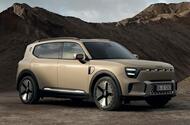Smart has made a surprising shift in their strategy by introducing a plug-in hybrid version of their new #5 SUV alongside the previously announced all-electric models. This decision, according to Smart officials in China, is a response to changing market trends and customer preferences, especially in markets like China where plug-in hybrids have been gaining popularity.
The plug-in hybrid version of the Smart #5 is expected to utilize a variant of the Thor system, similar to what is found in other recent Geely models. This system combines a turbocharged 1.5-liter four-cylinder petrol engine with an electronic dual-hybrid transmission, along with a 215bhp electric motor. This setup is known for its efficiency and performance, offering a good balance between combustion and electric power.
In contrast, the all-electric versions of the #5 come with impressive power figures, ranging from 335bhp to 416bhp, depending on the configuration. These electric models feature advanced battery technology with ranges between 354 and 460 miles, making them ideal for urban commuting and long-distance journeys.
While the plug-in hybrid #5 is expected to hit the markets in 2026, the all-electric versions are set to be available in European markets, including the UK, by mid-2025. This move by Smart reflects a broader trend in the industry, where automakers are diversifying their powertrain options to cater to a wider range of customer needs and preferences.
This shift in strategy is not unique to Smart, as other brands under the Geely umbrella, like Lotus and Zeekr, are also exploring hybrid and range-extender technologies for their upcoming models. Lotus, for example, has announced plans to introduce ‘Super Hybrid’ models with turbocharged combustion engines and electric motors, offering extended range capabilities of up to 680 miles.
Zeekr, on the other hand, is set to launch three plug-in hybrid models in 2025, including a new range-topping SUV. This diversification from pure-electric models showcases a strategic move towards offering a mix of powertrain options to meet the evolving needs of customers worldwide.
Overall, Smart’s decision to introduce a plug-in hybrid version of the #5 SUV marks a significant shift in their approach towards electric mobility. By embracing hybrid technology alongside their all-electric models, Smart is positioning themselves to cater to a broader market and stay competitive in an ever-changing automotive landscape.







